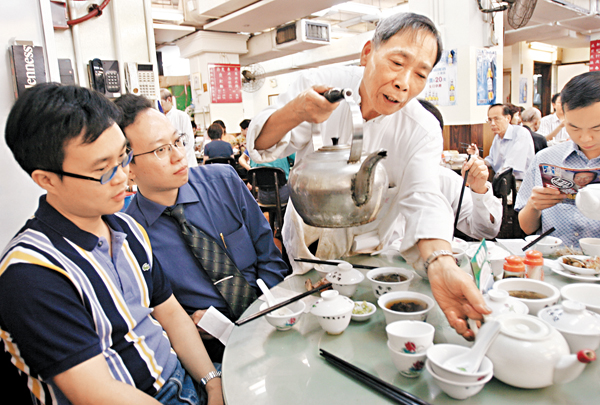 ■不同持份者對港人飲茶前洗碗都有不同意見。資料圖片
■不同持份者對港人飲茶前洗碗都有不同意見。資料圖片■龐嘉儀
原文
下文摘錄自香港《文匯報》8月26日報道:
各處鄉村各處例,不同地區均有其自家文化習俗(customs),其中廣東有一種飲食文化(food culture),就是用膳前會以滾水熱茶沖洗碗筷杯碟(eating utensil/ tableware)。不少人用水或茶沖洗已經清洗過的杯碗筷子,但到酒店內的高級餐廳用膳、吃法國菜或品嚐日本料理前,卻不會這樣做,原因為何?又是否有此需要?
約定俗成 VS 浪費食水
記者到食肆訪問食客(diner)及旅客對此習俗的看法。食客張小姐表明,對食肆背後的清潔(hygiene)沒有信心,習慣出外用餐會用水洗碗筷。食客李小姐表示,由於店員每次都會給予水兜盛載洗碗水,覺得約定俗成(common practice)也會洗一洗。不過梁先生就認為,這下意識(subconscious)舉動只是香港的飲食文化習慣,不認為香港食肆不夠衛生。
香港餐務管理協會(Association for Hong Kong Catering Services Management Ltd.)主席楊位醒指,本港餐飲業(catering industry)清洗碗筷杯碟的工序已很仔細和足夠,只是部分客人擔心桌上的碗筷杯碟已擺放一段時間,其間或有灰塵(dust)黏至,才會清洗。現時不少酒樓均有提供水兜予客人讓他們自行清洗,也曾見過有客人拿出紙巾擦一遍才使用餐具,但他認為,抹擦過程中反而令部分塵埃及紙碎留在餐具,變得不夠整潔。
他認為,若每人都作清洗的話,會造成食水浪費,建議要向消費者推廣環保(environmental protection)教育。
或有心理因素 醫生:作用不大
現代管理(飲食)專業協會(Association of Restaurant Managers)會長胡珠指,廣東飲食文化十分講究(exquisite),洗碗筷杯碟是希望令餐具暖和起來,「飲杯茶都舒服一點,心理因素(psychological factor)較強。」
有部分外籍人士知道港人有此習慣後,「跟足步驟去沖洗」。他覺得,這是多年來的習俗,難以一朝一夕改變。
有醫生指出,如杯碟碗筷早已用洗潔精(detergent)清洗,可引致腸胃疾病(gastrointestinal disease)的細菌(bacteria)仍殘留在餐具上的機會很微,因而導致食物中毒(food poisoning)的機會並不高;反之若杯碗沒有認真清潔,只用水沖洗作用也不大。
他認為大家進食前洗碗筷,多是因為見到碗筷仍油膩(oil stain)或有污垢,用熱水沖洗,可將肥膩或污垢清除。
環保組織「綠惜地球」(The Green Earth)總幹事劉祉鋒認為,無論中西食肆,均有責任向客人提供絕對乾淨的餐具,形容客人覺得餐具不清潔而即場沖洗的現象「好怪誕」。如果客人認為餐具不潔,應立即向食肆反映,要求更換。
譯文
Every country has its own customs and traditions. One of the Guangdong local food culture is that restaurant goers usually wash the plates and chopsticks etc. with a bowl of boiling water or hot tea before meals, though the eating utensils have been properly cleaned beforehand.
However, people seldom follow suit when they have meals at hotel restaurants or enjoy French or Japanese cuisine. What is the reason behind and if there is a need for this habit?
Local customs VS Waste of water
Reporters visited some restaurants and interviewed diners and visitors to collect their opinions on this custom. "I have no confidence in the hygiene of the restaurants, so I keep the habit of washing the tableware before meals," said Ms. Cheung. "As the restaurant staff would give customers an empty bowl for them to pour away the washed and dirty water, the washing-up seems a common practice," said another diner Ms. Lee.
Yet Mr. Leung thought that such subconscious action was just a reflection of the food culture in Hong Kong, not thinking the local restaurants unclean.
Mr. Yeung Wai-sing, chairperson of the Association for Hong Kong Catering Services Management Ltd., pointed out that the local catering industry had followed stringent cleaning and sanitation procedures in handling eating utensils, but some customers worried that utensils might have been placed on the table for some time, so they did the washing-up with the aim to remove dust. "Customers are usually provided with a bowl for the washing-up, while some may simply use paper towels to wipe the tableware. But in the process of wiping, dust and small pieces of paper may be left in the utensils, making them unclean," he said.
Mr. Yeung claimed that customers might waste water to do the washing-up, suggesting the government to promote a sense of environmental protection.
Psychological reasons might be present
Mr. Woo Chu, President of the Association of Restaurant Managers, expressed that the Guangdong food culture was very exquisite and the washing-up aimed to warm up the eating utensils. "This is to make tea-drinking more enjoyable. Psychological factors can play a significant role." Some foreigners may even follow the same practice as the locals do. He believed that such a custom would not be changed easily.
A doctor said that if the tableware had been properly washed on detergent, the chance of getting poisoned by the bacteria left that causes gastrointestinal diseases was low. But if they had not, the washing-up would have been in vain.
He added that people usually did so because oil stains and dirt are found, and indeed hot water can effectively remove the unpleasant residues from the utensils.
Mr. Lau Chi-fung, Executive Director of the environmental group The Green Earth, stressed that both Chinese and Western restaurants had the responsibility to offer absolute clean tableware, describing the practice of washing-up as "strange". He suggested customers should voice out immediately and ask for replacement if the utensils are deemed unclean.
Q&A
1. 「飲茶」可簡單譯作什麼?
2. 茶客通常喜歡「一盅兩件」,這可如何翻譯?
3. 「功夫茶」對茶具器皿也十分講究,它的英文是?
4. 廣東簡稱「粵」,其飲食文化即是什麼菜?
5. 世界三大菜系分別是什麼?
Answer
1. Yum cha
2. A pot of Chinese tea served with two dishes of dim sum
3. Kung fu tea
4. 粵菜(Cantonese cuisine)
5. 中國菜系(Chinese cuisine)、法國菜系(French cuisine)、土耳其菜系(Turkish cuisine)
